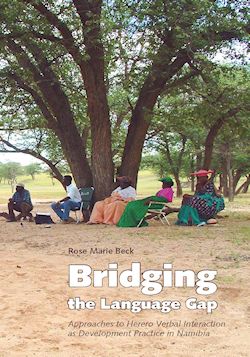
Bridging the Language Gap
Approaches to Herero Verbal Interaction as Development Practice in Namibia
Author: Rose Marie Beck.
Series: TIAS Topics in Interdisciplinary African Studies Volume 20
201112 pp. Roman, 277 pp.
1 map, 12 colour photos, including a CD-ROM with recordings and transcriptions
Text language(s): English
Format: 160 x 240 mm
570 g
Paperback
€ 69.80
Buy 'Bridging the Language Gap' as a downloadable PDF document directly from our online shop »
Order 'Bridging the Language Gap' as print edition »
This book is concerned with sense-making and knowledge production as linguistically mediated social processes. Fundamentally, two kinds of processes are discerned here, namely scientific sense-making and everyday sense-making. The central questions asked here address the theoretical and methodological framework needed for a methodologically rigorous reconstruction of practical, everyday sense-making, i.e. the transformation of every-day knowledge into scientific knowledge: How can scientists reconstruct and explain everyday sense-making and knowledge production? Which resources, of a scientific and everyday kind, can or do they need to draw upon? These questions, while they may be relevant for scientific reasoning in general, grow more acute in a situation, where the scientist experiences a profound difference between his or her own resources, inventories and practices and those of the studied object(s).
This is the case with this study; in fact, the difference between the way the Herero speaking community of Omatjete in the Northwest of Central Namibia knew and talked about things and Beck’s sense-making practices gave rise to these questions. Consequently, the attempt at a clarification of an adequate theoretical background which integrates language use – talk-in-interaction – and therefore language itself as social practice, and the methodological consequences in form of an Ethnographic Conversation Analysis are here understood as a prerequisite for reconstructing Herero ways of knowing and talking things.
Fieldwork for this study was carried out from 2003 to 2007 in the course of seven field stays of between three weeks and four months duration. Overall, a period of 14 months was spent in Omatjete, Omutiuanduko and Windhoek/Namibia. Most of the time was spent in the village of Omatjete with frequent trips, in the beginning all over the Communal Area, later on mostly to Omutiuanduko, where the research focus was set.
(as well Habilitation thesis: Goethe University Frankfurt am Main / Germany 2007)
Under these links you will find publications of the author, studies of the language, history and culture of the Hereros, as well as further analyses of linguistic pragmatics and discourse strategies:
Accompanying material:
- “We Thought we would be Free ...”
(ISBN 978-3-89645-057-9 ) - Frühe Kolonialgeschichte Namibias, 1880–1930
(ISBN 978-3-89645-058-6 ) - People, Cattle and Land
(ISBN 978-3-89645-363-1 ) - Reference Grammar of Herero (Otjiherero)
(ISBN 978-3-89645-602-1 ) - The Form and Meaning of Otjiherero Praises
(ISBN 978-3-89645-269-6 )
Cross-reference:
- African Media Cultures – Cultures de médias en Afrique
(ISBN 978-3-89645-246-7 ) - African Sociolinguistic and Sociocultural Studies
(ISBN 978-3-89645-721-9 ) - Gesprächsstrategien im Swahili
(ISBN 978-3-927620-41-4 ) - Language and Development
(ISBN 978-3-89645-720-2 ) - Speech Acts and Speech Events in African Languages
(ISBN 978-3-89645-893-3 ) - Texte auf Textilien in Ostafrika
(ISBN 978-3-89645-266-5 ) - Topics in West African Discourse-Pragmatics
(ISBN 978-3-89645-856-8 )
Reviews
"Bridging the Language Gap" by Rose Marie Beck is two books in one: a theoretical book asking critical questions concerning linguistic theory and manners of research and a second book of applied linguistic study researching the style of communication amongst members of a board concerned with the running of a local water pump in Namibia. [...]
Much of the first part of the book is very theoretical, but Beck enhances the accessibility by including her own very personal experiences with interactions and miscommunications (often stemming from “knowledge” problems) in her field sites. [...]
Included in the second part of the book are chapters of marvelously extensive background information concerning the physical location of the speakers, the history (including all present and past racial tensions) of the Herero, the sociolinguistic setting of otjiHerero, information on the organizations of which the meetings were recorded to provide the initial data for this work, as well as an extensive and very informative description of traditional and community meetings and an outline of the sequence of events at such community meetings. [...]
As well as such extensive background information, Beck also gives very detailed attention to the thought processes involved in every single step of her work. [...]
I particularly like it that Beck has brought these numerous considerations and choices that we are all as researchers obliged to make out into the open and that she discusses them so explicitly. [...]
Overall, "Bridging the Language Gap" is a very interesting and thought-provoking book. The book comes with a DVD that has the audio clips of the examples in the book as well as giving the examples with the interlinear glosses. It is well worth the read and I recommend it to all Africanist linguists.
Gertie Hoymann in Journal of African Languages and Linguistics, 35/2014, 130-133
| « back | Print version | [top] |
 Books
Books Audio
Audio Biographies
Biographies Series
Series Festschrifts
Festschrifts Journals
Journals